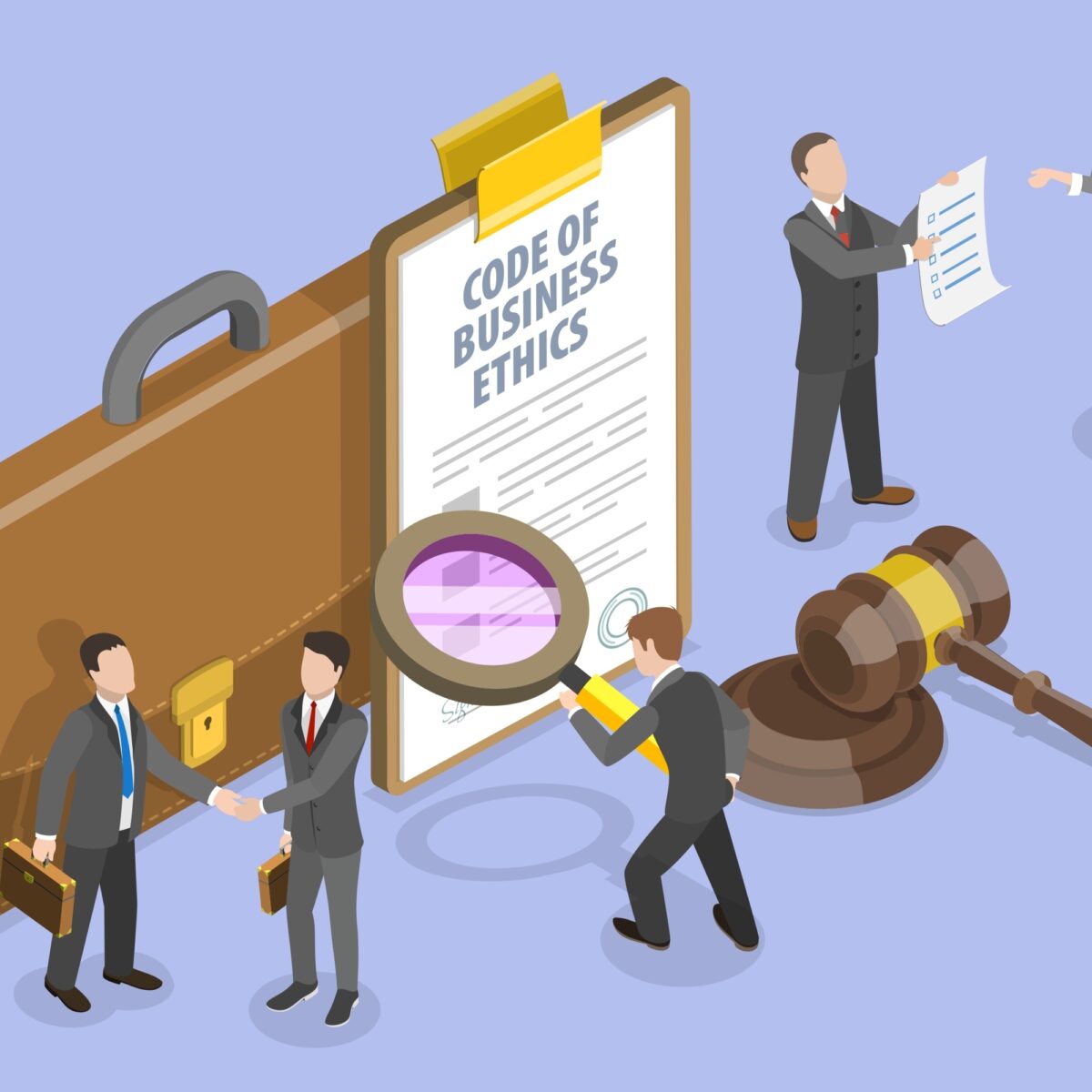In an era where ethical considerations are paramount, businesses are under increasing pressure to maintain transparent and responsible practices. Embracing ethical business practices not only safeguards a company’s reputation but also contributes to long-term success and customer trust. To help businesses navigate this complex landscape, a myriad of software solutions has emerged, offering tools and features to promote and monitor ethical conduct. In this article, we will explore some of the top software solutions that businesses can leverage to maintain ethical business practices.
Compliance Management Software
The sheer volume and complexity of regulations make it challenging for businesses to stay abreast of legal requirements, leading to an increased demand for robust Compliance Management Software (CMS). This article delves into the significance of compliance management and explores how specialized software can streamline processes, mitigate risks, and enhance overall corporate governance.
The Compliance Conundrum
Navigating the intricate web of regulations, laws, and industry standards is a daunting task for businesses. Whether it’s data protection, financial reporting, or industry-specific compliance, non-compliance can result in severe consequences, including legal penalties, damaged reputations, and financial losses. Recognizing the need for a systematic approach to compliance, businesses are turning to technology to stay on top of regulatory requirements.
What is Compliance Management Software?

Compliance Management Software is a specialized tool designed to help organizations systematically adhere to relevant laws, regulations, and standards. It provides a centralized platform that enables businesses to monitor, track, and manage compliance-related activities efficiently. Key features of CMS include risk assessment, policy management, audit trails, and reporting capabilities.
1. Centralized Repository for Regulations:
CMS acts as a central repository for all applicable regulations, allowing organizations to stay informed about changes and updates. This ensures that businesses have access to the latest information needed to adjust their internal processes accordingly.
2. Risk Assessment and Mitigation:
Effective risk management is a core component of compliance. CMS facilitates risk assessments by identifying potential compliance risks and helping organizations implement strategies to mitigate them. This proactive approach minimizes the likelihood of compliance breaches.
3. Policy Management:
Establishing and maintaining policies that align with regulatory requirements is crucial. CMS enables organizations to create, update, and communicate policies across the entire workforce, ensuring that employees are aware of the expectations and guidelines they need to follow.
4. Automated Workflows:
Manual compliance management is time-consuming and prone to errors. CMS automates workflows related to compliance activities, such as document approvals, training assignments, and audit preparations. This not only saves time but also enhances accuracy.
5. Audit Trails and Reporting:
CMS provides a comprehensive audit trail, documenting all compliance-related activities. This transparency is crucial for demonstrating compliance to regulatory authorities and internal stakeholders. Additionally, robust reporting features enable organizations to generate real-time insights into their compliance status.
Examples of Compliance Management Software
Several Compliance Management Software (CMS) solutions are available in the market, catering to diverse industry needs and regulatory requirements. Here are some notable examples:
- LogicGate: LogicGate is a flexible and customizable CMS platform that allows organizations to automate their risk and compliance processes. It offers features such as workflow automation, risk assessment, policy management, and reporting. LogicGate is known for its user-friendly interface and scalability.
- ZenGRC: ZenGRC is a cloud-based compliance management solution that simplifies regulatory compliance for businesses. It offers a centralized platform for managing policies, risk assessments, and audit processes. ZenGRC is designed to streamline compliance workflows and enhance collaboration within organizations.
- Convercent: Convercent is a comprehensive ethics and compliance software that covers various aspects, including policy management, case management, disclosure management, and training. It focuses on creating an integrated platform for organizations to manage all compliance-related activities.
- NAVEX Global: NAVEX Global provides a range of compliance and ethics solutions, including whistleblower hotline services, policy management, and training. Their platform aims to help organizations proactively manage and monitor compliance, ethics, and risk-related activities.
- SAP GRC (Governance, Risk, and Compliance): SAP GRC is an integrated solution that covers governance, risk management, and compliance aspects. It helps organizations manage risks, ensure compliance with regulations, and optimize business processes. SAP GRC is known for its comprehensive approach to addressing various compliance challenges.
- SAI Global EthicsAnywhere: SAI Global’s EthicsAnywhere is a compliance management platform that focuses on promoting ethical behavior within organizations. It includes features such as policy management, training, incident reporting, and third-party risk management.
- MetricStream: MetricStream is a GRC platform that encompasses compliance management, risk management, and audit management. It provides a centralized framework for organizations to streamline their compliance processes, monitor risks, and enhance overall governance.
- Resolver: Resolver is a cloud-based GRC platform that offers solutions for risk management, compliance, and incident management. It helps organizations identify and assess compliance risks, manage incidents, and maintain a proactive approach to governance.
- ComplianceLine: ComplianceLine specializes in whistleblower hotline services and case management. Their platform is designed to facilitate confidential reporting of ethical concerns, enabling organizations to address potential issues before they escalate.
- Assent Compliance: Assent Compliance focuses on supply chain data management and regulatory compliance. It helps organizations navigate complex global supply chain regulations, manage product compliance, and ensure the ethical sourcing of materials.
When selecting a Compliance Management Software, organizations should consider their specific industry requirements, the complexity of their regulatory landscape, and the scalability of the solution. Additionally, evaluating the customization options and integration capabilities of the software is crucial to align it with the unique needs of the business.
Selecting the Right CMS: Key Considerations
Choosing the right Compliance Management Software is a strategic decision that can significantly impact an organization’s ability to navigate the regulatory landscape effectively. Consider the following factors when evaluating CMS options:
1. Scalability:
An effective CMS should be scalable to accommodate the growth and evolving needs of your business. Ensure that the software can handle an increasing volume of compliance requirements as your organization expands.
2. User-Friendly Interface:
The usability of the CMS is crucial for widespread adoption within the organization. A user-friendly interface enhances accessibility and encourages active participation in compliance-related activities.
3. Integration Capabilities:
Seamless integration with existing systems, such as Enterprise Resource Planning (ERP) and Human Resources Management (HRM) software, is essential. This integration streamlines data sharing and ensures consistency across different organizational functions.
4. Customization Options:
Organizations have unique compliance needs based on their industry, location, and specific regulatory landscape. Look for a CMS that offers customization options, allowing you to tailor the software to meet your specific requirements.
5. Continuous Updates and Support:
The regulatory landscape is dynamic, with laws and standards frequently changing. Choose a CMS provider that commits to regular updates to ensure that your system remains current and compliant. Additionally, reliable customer support is crucial for addressing any issues promptly.
Ethics and Compliance Training Software
Ethics and Compliance Training Software play a crucial role in fostering a culture of integrity, transparency, and adherence to ethical standards within organizations. These software solutions are designed to deliver, manage, and track training programs related to ethics, compliance, and regulatory requirements. Here are some notable examples:
- Saba: Saba is a learning management system (LMS) that includes modules for ethics and compliance training. It offers a user-friendly interface, content authoring tools, and robust reporting features. Saba enables organizations to deliver engaging and interactive training content while tracking employee progress and compliance completion.
- Cornerstone OnDemand: Cornerstone OnDemand is a comprehensive talent management platform that includes an LMS with ethics and compliance training modules. It allows organizations to create and deliver customized training content, track employee compliance, and generate compliance reports. The platform supports various multimedia formats for interactive learning experiences.
- Skillsoft: Skillsoft offers a range of eLearning solutions, including ethics and compliance training modules. The platform provides a library of pre-built courses covering topics such as code of conduct, anti-bribery, and data privacy. Skillsoft’s content is designed to be engaging, relevant, and aligned with regulatory requirements.
- NAVEXEngage: NAVEXEngage, part of the NAVEX Global suite, focuses on ethics and compliance training. It provides a library of customizable training courses on topics such as harassment prevention, data protection, and workplace ethics. NAVEXEngage is known for its interactive content and mobile-friendly design.
- Everfi: Everfi is an education technology company that specializes in online training courses, including ethics and compliance training. Their courses cover a wide range of topics, including diversity and inclusion, anti-corruption, and workplace conduct. Everfi’s platform emphasizes interactive and scenario-based learning.
- Traliant: Traliant is a compliance training platform that focuses on creating interactive and engaging content. It offers customizable training modules on various topics, including diversity and inclusion, workplace harassment, and code of conduct. Traliant aims to deliver training that resonates with employees and promotes behavioral change.
- LRN: LRN provides ethics and compliance training solutions that focus on building an ethical culture within organizations. Their courses cover topics such as ethics, anti-corruption, and data privacy. LRN’s platform emphasizes a values-based approach to compliance training.
- 360factors: 360factors offers a compliance management solution that includes training modules. The platform provides tools for creating, delivering, and tracking compliance training programs. It is designed to help organizations streamline their compliance training processes and ensure that employees are well-versed in ethical standards.
- ComplianceWave: ComplianceWave specializes in compliance training, with a focus on creating engaging and impactful content. The platform covers various compliance topics, including anti-harassment, data protection, and workplace ethics. ComplianceWave aims to make compliance training accessible and effective for all employees.
- MediaPro: MediaPro offers a range of cybersecurity and compliance training solutions, including ethics training modules. The platform provides interactive and scenario-based content to educate employees on ethical behavior, data protection, and regulatory compliance.
When choosing an Ethics and Compliance Training Software, organizations should consider factors such as the relevance of the training content, the flexibility of the platform, reporting capabilities, and the ability to customize courses to align with specific industry regulations and internal policies. Additionally, a user-friendly interface and the availability of ongoing support are essential considerations for successful implementation and adoption within the organization.
Conclusion
In conclusion, the landscape of Ethics and Compliance Training Software is dynamic and crucial for organizations aiming to build and sustain a culture of ethical behavior and regulatory adherence. As businesses navigate complex regulatory frameworks and evolving ethical standards, the role of these software solutions becomes increasingly indispensable.
The examples mentioned, ranging from comprehensive learning management systems to specialized compliance training platforms, showcase the diversity and versatility of available options. Organizations can leverage these tools to design, deliver, and track training programs that align with their specific industry regulations, internal policies, and ethical guidelines.
The significance of investing in Ethics and Compliance Training Software extends beyond mere regulatory compliance. These tools contribute to creating a workplace culture where ethical conduct is not just a box to check but an integral part of the organizational DNA. By providing engaging and interactive training content, these platforms empower employees to make informed decisions, recognize ethical dilemmas, and act in accordance with established standards.
Moreover, as technology continues to advance, the future of Ethics and Compliance Training Software holds the promise of even more interactive, personalized, and adaptive learning experiences. Integration of artificial intelligence and data analytics may further enhance the effectiveness of training programs by tailoring content to individual needs and predicting areas of potential risk.
However, it’s essential to recognize that the implementation of these tools is just one aspect of building an ethical culture. Organizations must complement software solutions with a holistic approach that includes leadership commitment, clear communication of values, and continuous reinforcement of ethical principles.
In a world where reputational risks and regulatory scrutiny are ever-present, Ethics and Compliance Training Software serve as invaluable allies for organizations committed to not only meeting legal requirements but also instilling a sense of integrity and responsibility across all levels. As businesses strive for sustained success and positive societal impact, the investment in ethical training is an investment in the foundation of a resilient and ethically sound organizational future.






